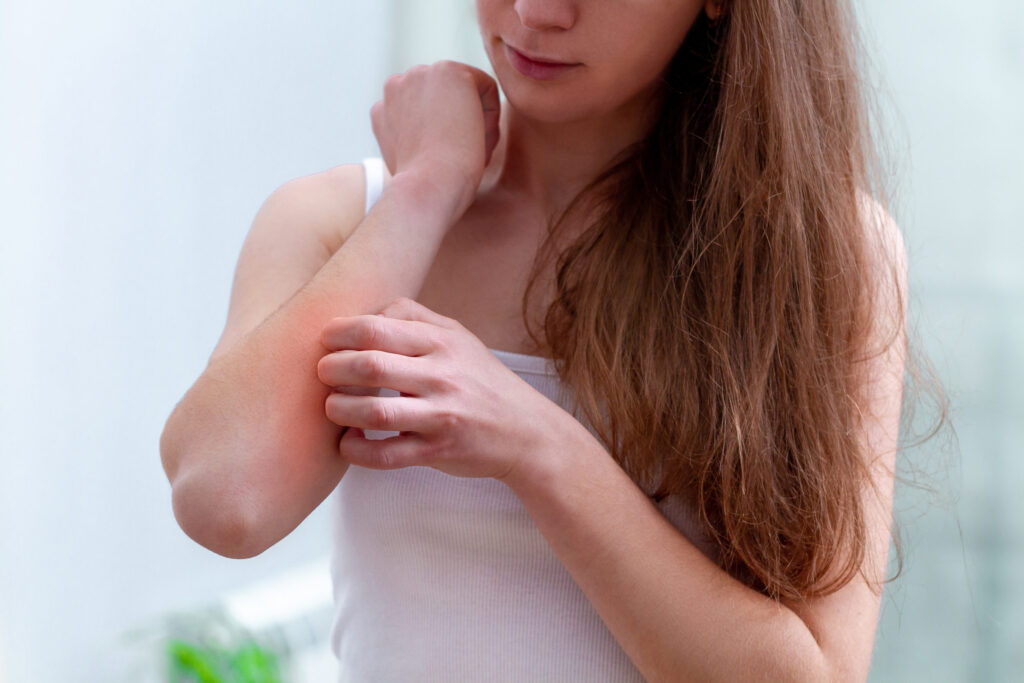Anyone can have a serious allergic reaction to a bug bite, even if they’ve never experienced one before. When a person gets bit by insects over time, their body may become sensitized to the venom in the sting or bite. This can lead to an allergic reaction each time they are exposed to it. According to the American College of Allergy, Asthma & Immunology, insect stings cause allergic reactions in 5% of the U.S. population.
With warmer weather and more outdoor activities on the way, it’s important to be mindful of bug bites and watch out for any sign of trouble. While most bug bites can be safely treated at home it’s important to watch for symptoms of an allergic reaction or infection, so you know when to seek medical attention for a bug bite.
Signs that a bug bite needs medical attention
Moderate to severe allergic reaction
In rare cases, a bug bite may trigger a severe allergic or anaphylactic reaction. This reaction can occur immediately or within 8 hours of being bitten. Call 911 or go to your local urgent care or emergency room if your bug bite:
- Causes the face, eyes, lips, throat or hands to swell
- Leads to any kind of breathing difficulty or rapid heartbeat
- Causes sudden confusion or dizziness
- Is accompanied by hives (a raised skin rash) and itching all over the body
- Leads to nausea, cramps, other stomach problems or bowel issues
- Causes problems with swallowing
Infection
Bug bites are itchy, and scratching them can make you feel better. But if you break the skin, you can transfer bacteria from your hand to the bite and cause an infection. Visit an urgent care facility if your bug bite:
- Is accompanied by fever, chills or swollen lymph nodes
- Feels warm to the touch
- Becomes increasingly swollen or red over the first 24 hours
- Appears to have a red line extending from it
- Is producing pus
- Has sores on or around it
- Is extremely painful
Common infections caused by scratching
The most common infections of bug bites are:
- Impetigo
Impetigo is a skin infection caused by bacteria and leads to red sores around the bite. These sores eventually rupture, ooze for a few days and then form a yellowish crust. This type of infection is typically not dangerous can be treated with antibiotics. However, untreated impetigo can cause cellulitis and kidney issues. - Cellulitis
Cellulitis is a bacterial infection that can be treated with antibiotics. Symptoms often include redness that spreads from the bite, fever, swollen lymph nodes, chills and pus coming from the bite. Untreated or severe cellulitis can cause blood poisoning (sepsis). - Lymphangitis
Lymphangitis is an inflammation of the lymphatic vessels and is often a sign that a skin infection, like impetigo, is getting worse. Symptoms include enlarged lymph nodes, fever, chills, headache, loss of appetite, muscle aches and throbbing pain in the affected area. Lymphangitis can be treated with a course of antibiotics. If you need additional help alleviating symptoms, your doctor may also recommend pain medications and anti-inflammatories.
It’s important to understand when to seek medical attention for a bug bite. If you’re experiencing an allergic reaction or symptoms of infection, don’t ignore them because they can get more serious if they’re not treated quickly. If you’ve got a problem with a bug bite, visit Thibodaux Regional Urgent Care – Houma. Walk-ins welcome 7 days a week from 9 a.m. – 8 p.m.




